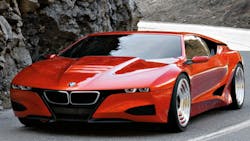Trump Tariff Threat on European Cars Escalates Global Trade War
President Donald Trump threatened a 20% tariff on cars imported from the European Union unless the bloc removes import duties and other barriers to U.S. goods, escalating a global trade war the EU warned could endanger $300 billion in commerce.
“Based on the Tariffs and Trade Barriers long placed on the U.S. and it great companies and workers by the European Union, if these Tariffs and Barriers are not soon broken down and removed, we will be placing a 20% Tariff on all of their cars coming into the U.S. Build them here!” Trump said in a tweet on June 22..
The EU planned to retaliate, according to a European Commission memo obtained by Bloomberg. “An introduction of U.S. tariffs would be met with equivalent penalties imposed by affected trading partners,” it said.
Shares of Volkswagen AG, Daimler AG and BMW AG fell in Frankfurt, and U.S. auto companies retreated after earlier gains.
Trump’s tweet came hours after the EU imposed tariffs on about $3.3 billion of American products in response to his barriers to imported aluminum and steel.
The European tariffs target politically resonant products, including 25% duties on Harley-Davidson Inc. motorcycles, Levi Strauss & Co. jeans and bourbon. The EU measures cover a total of around 200 categories, also including various types of corn, rice, orange juice, cigarettes, cigars, t-shirts, cosmetics, boats and steel.
Trade War
Trump’s latest salvo against the European auto industry threatens to broaden a trade war that he’s already sparked with China. The U.S. has pledged to impose 25% tariffs on $34 billion in Chinese goods on July 6, and China vowed to retaliate in the same amount of U.S. imports.
The U.S. may justify the auto tariffs on the grounds of national defense, just as it did in March when imposing duties on global imports of steel and aluminum. Trump initially exempted the EU from the metal tariffs, but let the temporary reprieve expire after negotiations with the Europeans fell apart.
America’s Ambassador to Germany Ric Grenell is in Washington this week seeking a deal on auto levies. He spoke to White House trade adviser Peter Navarro, Commerce Secretary Wilbur Ross, U.S. Trade Representative Robert Lighthizer and Treasury Secretary Steve Mnuchin about reducing existing tariffs on cars shipped between the U.S. and Europe to zero. There’s support in the administration and from German carmakers for such an idea, but no agreement has been reached yet.
Rarely Used
The Commerce Department in May started investigating whether imports of cars and light trucks hurt America’s ability to defend itself by eroding the country’s auto industry. If the findings show a threat to the U.S., a 1960s-era trade law gives the president authority to impose import restrictions without congressional approval.
Many lawmakers have been critical of Trump’s use of the trade law, which was rarely applied before he took office. Ross during a Senate hearing on June 20 faced heated questions from GOP lawmakers who argued there was no merit to claiming auto imports threaten the country’s defense capabilities.
Bill Reinsch, senior adviser at the Center for Strategic and International Studies in Washington and former Commerce official, said the president’s tweet may undermine his government’s argument for auto tariffs.
“Having ordered an investigation into whether auto imports are a national security threat, he has now undercut that by reaching his conclusion before the investigation has barely begun,” Reinsch said. “It’s a classic case of ‘ready, fire, aim,’ and it will only lead to litigation in the U.S. and a loss at the WTO when we are inevitably taken there.”
The Washington trade association for BMW, Daimler and Volkswagen’s operations in the U.S. warned consumers will be harmed by higher tariffs. “Consumers fare best when tariffs are low,” Gloria Bergquist, a spokeswoman for the Alliance of Automobile Manufacturers, said in a statement. The group also represents General Motors Co. And Fiat Chrysler Automobiles NV.
Trump’s tariff rhetoric further undermines a U.S. auto market already in its second year of decline after record sales in 2016, said Cody Lusk, president of the American International Automobile Dealers Association. He pointed to Daimler’s decision on June 21 to pare its profit outlook as an early example.
“You’re already going to see prices going up incrementally as a result of the steel and aluminum tariffs in the auto sector,” said Lusk, whose group represents foreign-branded auto dealers in the U.S. “All of that combined with increasing interest rates is a recipe for disaster.”
By Jenny Leonard and Richard Bravo
About the Author
Bloomberg
Licensed content from Bloomberg, copyright 2016.
